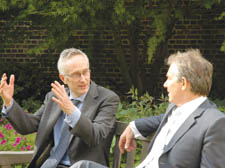
Michael Barber chatting to former PM Blair |
Barber sticks by Blair through ‘fick and fin’
Michael Barber chatting to former PM Blair Francis Beckett reviews new books that reflect education policy
MICHAELBarber was a good man fallen among Blairites. A teacher, then a trade union official, then an education professor, he rose to head up the Stan- dards and Effectiveness Unit in David Blunkett’s Department for Education and Skills, then moved to Downing Street to set up Blair’s Delivery Unit.
I knew him when he was with Blunkett. He and his political master had remarkably different styles. He sat with me over pints of beer in the Westminster Arms, thoughtful- ly trying to persuade me that my criticisms of New Labour education policy were mistaken. Blunkett bullied and blustered, threatening to sue me.
Barber’s memoirs, In - struction to Deliver, are entertaining, well-writ- ten, occasionally indis- creet, but discreet where it matters. He is no Alas- tair Campbell: having taken the Blairites’ shilling and done their bidding, he is not going to turn on them now.
All the same, there’s the occasional uninten- tional glimpse of how government under Blair worked. I loved the moment, at a Delivery Unit seminar, when Blair got up to go and, accord- ing to Barber, “he touched my shoulder as a friendly gesture to say goodbye. I doubt this was thought through from his point of view, but to me, in front of that audience, the ges- ture was of incalculable benefit”. You get the strong sense of a medieval court, where a touch from the king implies favour.
Barber was not always wrong, but he was wrong about many things, and one of them was testing, as Warwick Mansell demonstrates in Educa- tion by Numbers. This careful, forensic book from the only journalist to have specialised in this arcane subject, shows how the government’s narrow focus on testing and statistics has dam- aged British education.
Children now face assessment at ages 5, 7, 11, 14, 16, 17 and 18. As Mansell puts it: “results statistics are the key to whether teachers, subject departments and schools are judged successes or failures.” Inspirational teaching is out. Teaching to the test –the tick-box approach – is in as I realised when I tried help- fully suggesting to my son someangles on an A- level history subject that might not have occurred to him. He knew better: his teacher had told him the things he needed to know. He was right: he ignored me, and got an A.
Which is a part of the reason why Martin Allen and Patrick Ainley argue, in Education make you fick, innit?, that education as it is now organised is little more than an instru-
ment of social control.
“Dedicated obsessively to the vocational ‘needs’ of the economy, education, whether in school, college or university, no longer aspires to emancipate the minds of future genera- tions.” This passionate and thoughtful book provides a potted history of British education since the 1944 Education Act. It devotes a chapter to the Thatcherite revolution and another to New Labour, neither of which are at all attractive to Allen, a schoolteacher, and Ainley, professor of training and education at GreenwichUniversity. Theirs is the idealistic left-wing view which lay at the heart of the1944 Act, and it is cheering to see that this view still has such lucid and coherent advocates.
click here to order
click here to order
|